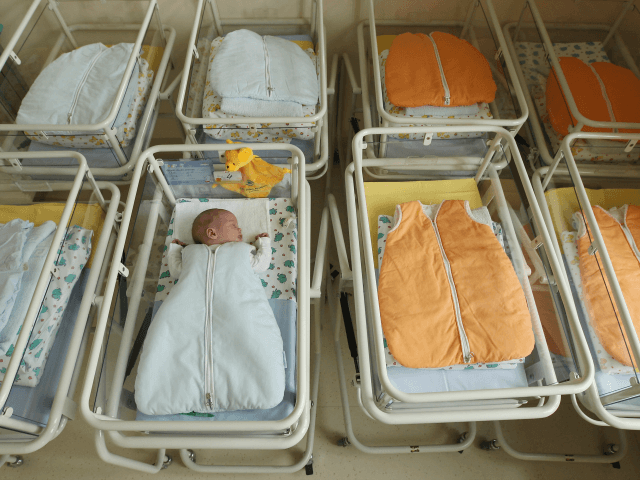The birth rate in England and Wales has fallen again and is now at the lowest level since records began, yet the population of the United Kingdom continues to rise, underlining the massive impact immigration continues to have on the nation.
The latest statistics, which show live births have fallen by a tenth since 2012, largely driven by lifestyle choices leading women to start families later and later and the inevitable fertility problems that come with that, come months after similar statistics showed Scotland too was experiencing record-low birth levels.
Fertility Falls in EU, Not ONE Country Hits Population Replacement Level https://t.co/C0ASzuOBms
— Breitbart London (@BreitbartLondon) March 14, 2019
Figures from the Office of National Statistics (ONS) in London show were 657,076 live births in England and Wales in 2018, a decrease both in real terms of three per cent in one year, and a fall in the fertility rate to 1.7 children per woman. To maintain a stable population, it is broadly accepted that a nation or group’s fertility rate must be at least 2.1 children per woman.
In context, 657,076 live births mean there were 11.1 live births per 1,000 total population in 2018, the lowest number since records of this type began in 1938. The figure has fallen by half since 1947, the record year for births in the immediate post-war era. As the ONS notes, all metrics for births are now “at or near record lows”.
Remarkably, the fertility rate for women in England and Wales is now lower than during the darkest days of the Second World War, when military conscription saw huge numbers of young men taken away from their homes and loved ones and sent around the world to fight. During the course of the war over 800,000 British were killed, with casualties heavier among young people.
An analysis of the figures by the ONS offered some explanations for the changes, noting that women now delay having their first child later than ever and citing increased participation in education and the workforce for this trend. Since 2014, more women over 40 have children in a year than women under 20, and even with all the advances of fertility science and IVF, women over 40 still had more children in the year records began, 1938, than did in 2018.
Don’t Worry About Fertility Falling Because Immigration and A.I. Will Replace the Unborn, Says Academic https://t.co/WhKKdclXhD
— Breitbart London (@BreitbartLondon) December 26, 2018
The statistics came as a new study revealed that nine in ten adults under the age of 29 said they felt their life had no purpose, with half of the respondents believing their purpose on earth was to make themselves happy.
Despite the falling rate of childbirths and fertility, the population of the United Kingdom continues to enjoy rapid growth, thanks to mass migration. As Breitbart London reported in 2018, 82 per cent of population growth this century has been down to migrant arrivals. Remarking on these figures, Lord Green of Deddington, Chairman of Migration Watch UK, said: “The government have been remarkably coy about the true impact of immigration on our public services over the past sixteen years… Immigration on the current scale is rapidly changing the size and nature of our society.”
While migrant women moving to the United Kingdom tend to have higher birth rates than born-British mothers, that can depend on where they migrated from. As the ONS itself notes in its analysis: “European fertility rates are generally lower than those in England and Wales, whereas rates in countries such as Pakistan and India are higher.”
The British government’s policy on births appears to be to continue promoting birth control to women, and to propagate population growth through mass migration, although not all European nations have decided to follow that model. In Poland, where the government once told young people to “breed like rabbits” to reverse the declining birth rate, the government has approved a special pension for mothers and has pursued other pro-family policies.
Hungary has gone even further, announcing a “budget for families” and giving $33,000 loans to newly married couples. Repayments on the loan are suspended if the couple have their first child within a set number of years, and the debt forgiven altogether if the couple goes on to have a third child.
Hungarian Government Will Give $33,000 Bonus to Married Couples Who Have Three Children https://t.co/twV072eq7e
— Breitbart London (@BreitbartLondon) August 1, 2019
Oliver JJ Lane is the editor of Breitbart London — Follow him on Twitter and Facebook

COMMENTS
Please let us know if you're having issues with commenting.